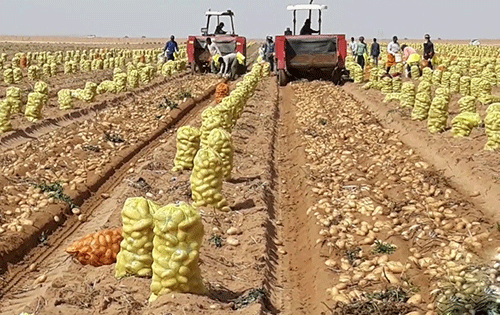The incoming board of directors at the Namibian Agronomic Board (NAB) has been urged to consider escalating prices of goods and services, and has thus been urged to keep food affordable.
The board has been asked to make this consideration while promoting the development and growth of the entire Namibian agronomic sector value chains, including production, processing, marketing and distribution.
The incoming members were also reminded to ensure that growth and development are inclusive, and to empower previously disadvantaged Namibians, specifically the women and youth.
This plea was issued yesterday by agriculture, water and land reform minister Calle Schlettwein, who cautioned the incoming board that over 70% of the population depends on agriculture for their livelihood.
The minister also pointed out that Namibia is still ranked as the second most skewed economy in the world with great income inequality.
“When we consider support programmes for food production, it is important to remember that we are dealing with a basic commodity, which is essential for life and, therefore, the affordability of food must be pivotal in our considerations. No one may be hungry in our country; therefore, food prices may never breach affordability thresholds,” said the minister at the inauguration of the new board.
Schlettwein further pointed out that the agronomic sector offers the best economic opportunities for job creation, specifically youth employment, as well as improved livelihoods.
The NAB is mandated to promote the agronomic industry and facilitate the production, processing, storage and marketing of controlled products in Namibia.
The agriculture minister continued that Namibia needs to focus its support on the thousands of small-scale horticultural and agronomic producers to improve overall productivity and links and access to well-paying markets.
Only then, he said, will the country successfully bring about less inequality with improved standards of living.
“We are still characterised as an economy that consumes what it does not produce and produces what it does not consume. This situation makes Namibia very vulnerable with regards to food security, hence our need to become food self-sufficient for basic foods, such as grains and other staple foods,” said the concerned minister.
Meanwhile, a declaration of agronomic crops has the specific purpose of intervening in value chains with multiple objectives.
This includes improving production towards self-sufficiency and beyond, developing support schemes for producers, maintaining national food security and ensuring food remains accessible and affordable.
The NAB’s new ten-member board consist of Hubertus Hamm (reappointed chairperson), Marina Muller (reappointed vice chairperson), Gerhard Engelbrecht, Peter Kawana, Salomo Mbai, Jacob Hamutenya, Sonja Molebugi, Maria Pogisho, Ruthy Masake and Violet Simataa.
The board is set to serve for three years from 2023-2025.
– mndjavera@nepc.com.na


